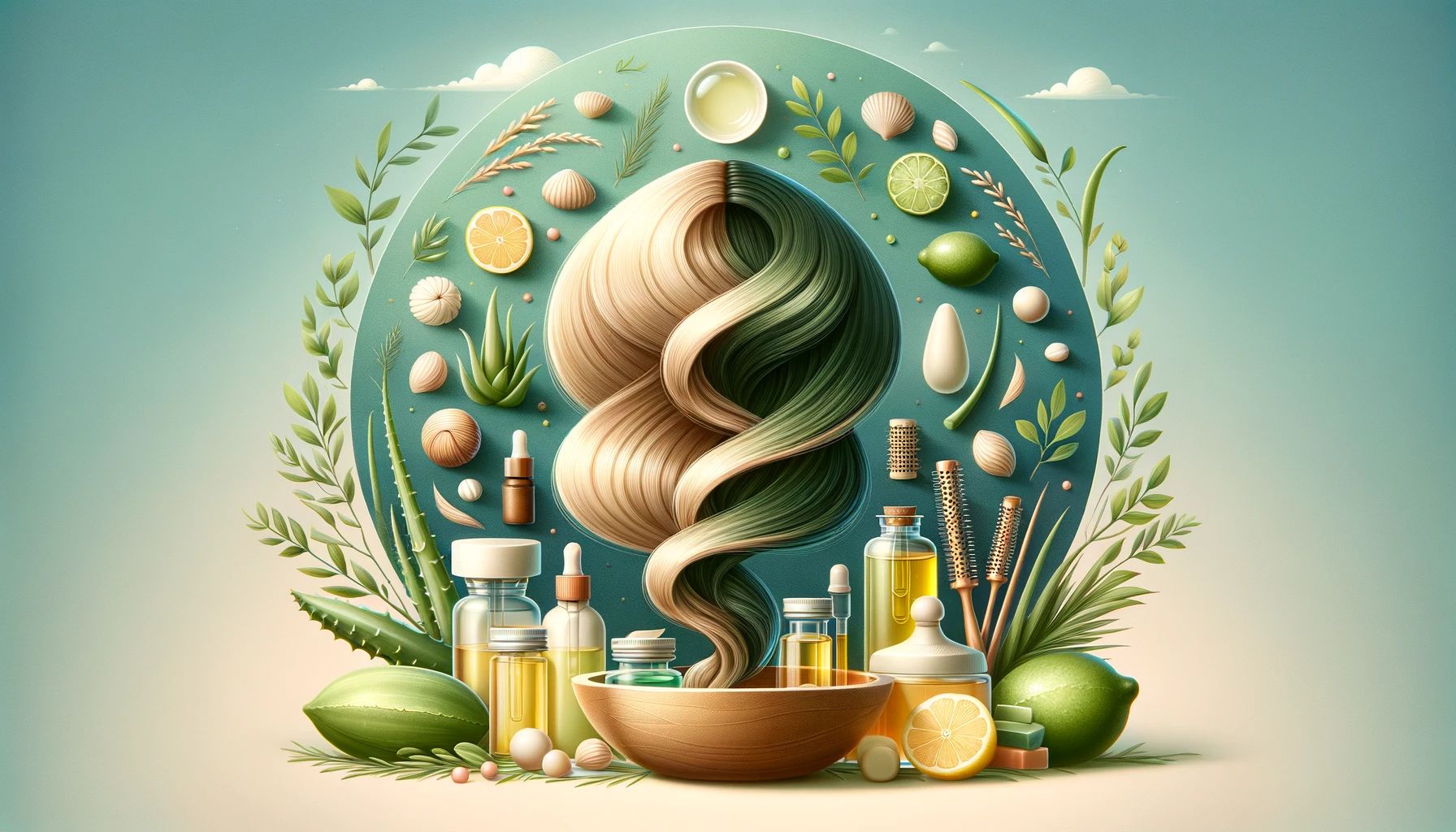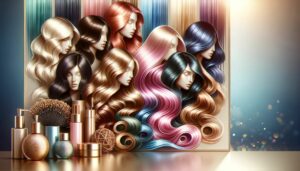
Unconventional Herbal Magic for a Dandruff-Free Scalp
A lustrous mane begins with a healthy scalp. Yet, for many, an oily scalp presents a puzzle wrapped in a riddle. In this comprehensive guide, we delve into the crux of this dilemma, unraveling the intricate tapestry of scalp health and its profound significance that transcends mere aesthetics.
Understanding the Oily Scalp Dilemma: A Brief Overview
The journey to scalp equilibrium begins with exploring the oily scalp enigma. An excess of sebum, the natural oil the scalp produces, can lead to a lustrous yet greasy appearance. Understanding this condition necessitates a deep dive into the biological processes that govern sebum production, laying the groundwork for effective management strategies.
The Importance of Scalp Health: Beyond Aesthetics
Scalp health is the cornerstone of hair vitality, influencing everything from hair growth to its natural sheen. This segment illuminates the importance of a well-balanced scalp environment, emphasizing its role in overall hair health and its impact on personal well-being and confidence.
Root Causes of Oily Scalp
Genetics and Oily Scalp: Is It In Your DNA?
Genetics plays a pivotal role in determining scalp characteristics. This section delves into the hereditary aspects of oily scalp conditions, exploring the genetic predispositions that influence sebum production and offering insights into managing this inherent trait.
Hormonal Influences: How They Affect Scalp Oil Production
Hormones are the unsung heroes in the narrative of scalp health. Fluctuations in hormonal levels can significantly impact sebum production. Here, we explore the symbiotic relationship between hormones and scalp oiliness, shedding light on how different life stages and conditions influence scalp health.
Diet and Lifestyle: Their Role in Scalp Health
The adage “you are what you eat” holds for scalp health. This section highlights the profound impact of dietary choices and lifestyle habits on scalp condition, suggesting modifications to promote a healthier environment.
Environmental Factors: Weather and Pollution Impacts
External environmental factors, from the sweltering heat of summer to the pollution in urban landscapes, play a crucial role in scalp health. This discussion focuses on how weather and environmental pollutants affect scalp oiliness and offers strategies for protecting the scalp from these external aggressors.
Daily Habits and Scalp Care
Shampooing Techniques for Oily Scalp: Finding the Right Balance
The quest for the perfect shampoo routine for oily scalps is akin to an art form. This section provides a detailed guide on the optimal frequency and shampooing methods, helping individuals strike a delicate balance between cleanliness and natural oil preservation.
Conditioning Without the Weight: Tips for Oily Scalp
Conditioning oily hair without exacerbating the issue requires finesse. Here, we offer practical tips for choosing and applying conditioners that hydrate and nourish the hair without adding unnecessary weight or oiliness.
Brushing Basics: Stimulating vs. Aggravating the Scalp
The act of brushing, while seemingly mundane, holds significant sway over scalp health. This segment delves into the best practices for brushing, discussing how different techniques and tools can either stimulate the scalp beneficially or aggravate an oily condition.
Lifestyle Adjustments: Diet and Exercise for Scalp Health
Adopting a holistic approach to scalp health, this section emphasizes the importance of a balanced diet and regular exercise. We explore how these lifestyle adjustments regulate sebum production and promote the overall health of the scalp and hair.
Choosing the Right Products
Decoding Ingredients: What to Look for and Avoid
The bewildering array of hair care products can be daunting. This section serves as a primer on the key ingredients to seek out and those to avoid, guiding readers through the labyrinth of product labels and marketing claims.
Specialized Scalp Treatments: Are They Worth It?
Specialized treatments, often touted as miracles for scalp woes, are put under the microscope. We examine the efficacy of these treatments, weighing their benefits against the investment of time and money.
DIY Remedies vs. Store-Bought Solutions: Pros and Cons
The debate between homemade remedies and commercial products is as old as time. This segment compares the advantages and drawbacks of both approaches, providing a balanced perspective to help readers make informed decisions.

Advanced Scalp Care
Deep Cleansing Rituals: Monthly Routines for Oily Scalp
Deep cleansing rituals offer a reset button for the scalp. This part outlines monthly routines tailored for oily scalps, focusing on methods that thoroughly cleanse while maintaining the delicate balance of the scalp’s natural ecosystem.
Balancing pH Levels: Importance and Methods
The pH level of the scalp is a critical yet often overlooked factor in scalp health. Here, we explore the significance of maintaining the right pH balance and provide practical tips for achieving and sustaining this balance.
Detoxifying Scalp Masks: Recipes and Benefits
Detoxifying scalp masks are the crown jewels of scalp care. We conclude with a collection of recipes for homemade scalp masks designed to combat oiliness. We also discuss their benefits and contribution to a holistic scalp care regimen.
Tackling Common Misconceptions
Oily Scalp Myths Debunked: Separating Fact from Fiction
In scalp health, myths and misconceptions abound, like unwelcome weeds in a flourishing garden. One pervasive myth is that oily scalp is a sign of poor hygiene. It’s often a natural physiological response where sebaceous glands, those microscopic oil factories, work in overdrive. Another common fallacy is the notion that oily scalp leads to hair loss. While excessive oil can create a breeding ground for dandruff-causing microbes, it does not directly correlate with hair thinning or loss. Understanding these misconceptions is pivotal in adopting a nurturing approach toward scalp care.
Over-Washing Woes: How It Can Worsen Scalp Oiliness
The instinctual response to an oily scalp is to embark on a rigorous washing regimen. However, this practice can backfire spectacularly. Overwashing strips the scalp of its natural oils, triggering a counterproductive response wherein the sebaceous glands escalate oil production. This vicious cycle exacerbates the problem it seeks to solve. Moderation and choosing the right products become key to breaking this cycle.
Expert Advice and Tips
Professional Insights: Trichologist’s Tips for Oily Scalp
Trichologists, the sentinels of scalp health, offer invaluable insights into managing an oily scalp. A cornerstone of their advice is the judicious selection of hair care products. Opting for non-comedogenic, sulfate-free shampoos can prevent pore blockage and reduce irritation. A gentle scalp massage during washing can also stimulate blood circulation, supporting healthy hair growth while regulating oil production.
Managing Expectations: Realistic Goals and Results
Embarking on a journey towards a healthier scalp requires patience and realistic expectations. An immediate transformation is a rarity; gradual improvement is the norm. It’s crucial to understand that a completely oil-free scalp is neither attainable nor desirable, as some natural oil is necessary for maintaining hair health and luster.
Long-Term Scalp Health
Maintaining Balance: Long-Term Strategies
For long-term scalp health, consistency is key. Incorporating a balanced diet rich in vitamins, minerals, and antioxidants can profoundly impact. Regular, but not excessive, washing with suitable products and occasional deep cleansing treatments can maintain the delicate equilibrium of the scalp’s ecosystem.
Stress and Scalp Health: Managing Internal Factors
The often-overlooked connection between stress and scalp health cannot be overstated. Stress can disrupt hormonal balances, exacerbating oil production. Stress-management techniques like meditation, regular exercise, and adequate sleep can play a pivotal role in regulating scalp health.
Regular Check-Ups: When to See a Specialist
While home remedies and over-the-counter products can be effective, certain conditions necessitate professional intervention. Persistent issues such as severe itching, excessive flaking, or sudden changes in scalp condition warrant a visit to a dermatologist or trichologist.
Conclusion
Embracing Your Unique Scalp Type: A Positive Outlook
Embracing your unique scalp type is the first step towards a harmonious relationship with your hair. Understanding that each scalp is as individual as a fingerprint can foster a more accepting and positive outlook toward scalp care.
Key Takeaways and Final Thoughts: Empowering Your Scalp Care Journey
This journey through the intricacies of managing an oily scalp underscores the importance of debunking myths, adopting expert advice, and maintaining long-term health strategies. The key takeaway is the empowerment from informed choices and consistent care, paving the way for a balanced and healthy scalp. Your scalp care journey embraced with knowledge and patience, can be a fulfilling and transformative experience, leading to healthier hair and a more confident and self-assured you.





